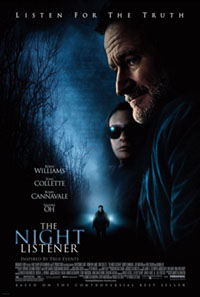 THE NIGHT LISTENER
THE NIGHT LISTENER(R)
*** (out of 5)
August 4, 2006
STARRING
Robin Williams as GABRIEL NOONE
Toni Collette as DONNA D. LOGAND
Joe Morton as ASHE
Bobby Cannavale as JESS
Rory Culkin as PETE D. LOGAND
Sandra Oh as ANNA
Studio: Miramax
Directed by: Patrick Stettner
BY KEVIN CARR
Listen to Kevin’s radio review…
Robin Williams is easily one of the greatest actors of his generation. Unlike many, I actually prefer his dramatic work, and I love his dark dramatic work. Although none of these films have been big hits, Williams gave us some of his best work in films like “Insomnia” and “One Hour Photo.” (Heck, I even liked him in “Death to Smoochy.”)
Williams is the main reason to see “The Night Listener.” It’s one of his finest jobs acting, and its a stark reminder that when you remove his goofy improv schtick, he’s unstoppable on screen.
The film tells the story of Gabriel Noone (Williams), a night-time radio show host who reads stories to his listeners across the country. His publisher gives him a manuscript from a 14-year-old boy who was abused by his family. It tells the child’s horrific tale, culminating in the fact that he is now dying of AIDS.
Noone spends time talking to the boy on the phone, and the boy’s caregiver, a social worker named Donna Logand (Toni Collette). However, as their friendship grows, Noone soon begins to question whether the child really exists or if he is a creation of Logand herself. This sends Noone on a cross country quest to confirm the existence of the boy.
I gave this film a reluctant three stars out of five. There’s a lot to like in the first half. The acting is rather superb, with excellent performances by Robin Williams and Toni Collette. However, it loses so much steam and power by the time you reach the end, the film as a whole suffered greatly.
The story is based on actual events encountered by Armistead Maupin, it’s author. Maupin, along with others, was duped into believing a 14-year-old child wrote a book, and that child was dying of AIDS. Maupin, who is a staunch gay activist, took a shine to the story. However, when he started to do some research into the boy’s life, he couldn’t prove his existence.
While truth is often stranger than fiction, it doesn’t always have the best timing or the greatest payoff. That’s why people like Maupin (and the character of Gabriel Noone in the movie) have to embellish so much. Unfortunately, by trying to stay realistic, the movie doesn’t remain dramatic.
Think of it in terms of “Psycho.” Imagine if Hitchcock wanted to keep Robert Bloch’s original story true to the accounts of Ed Gein. While Gein was a fantastic subject to study, and his crimes were horrific, his demise did not end in a Hollywood fanfare. While the Gein story is fascinating, I still prefer the ending of “Psycho” with Vera Miles screaming bloody murder as Norman Bates burst in wearing the dress and wig.
When it comes to the atmosphere of the film, it’s put together rather well. It has all the elements of the perfect suspense film. The only thing missing is the reason for the suspense. When big reveals are made, they are empty and lose their impact.
Ultimately, “The Night Listener” works about half way. It’s worth seeing for the performances, but it’s something to go in with low expectations on the plot itself.
Podcast: Play in new window | Download
